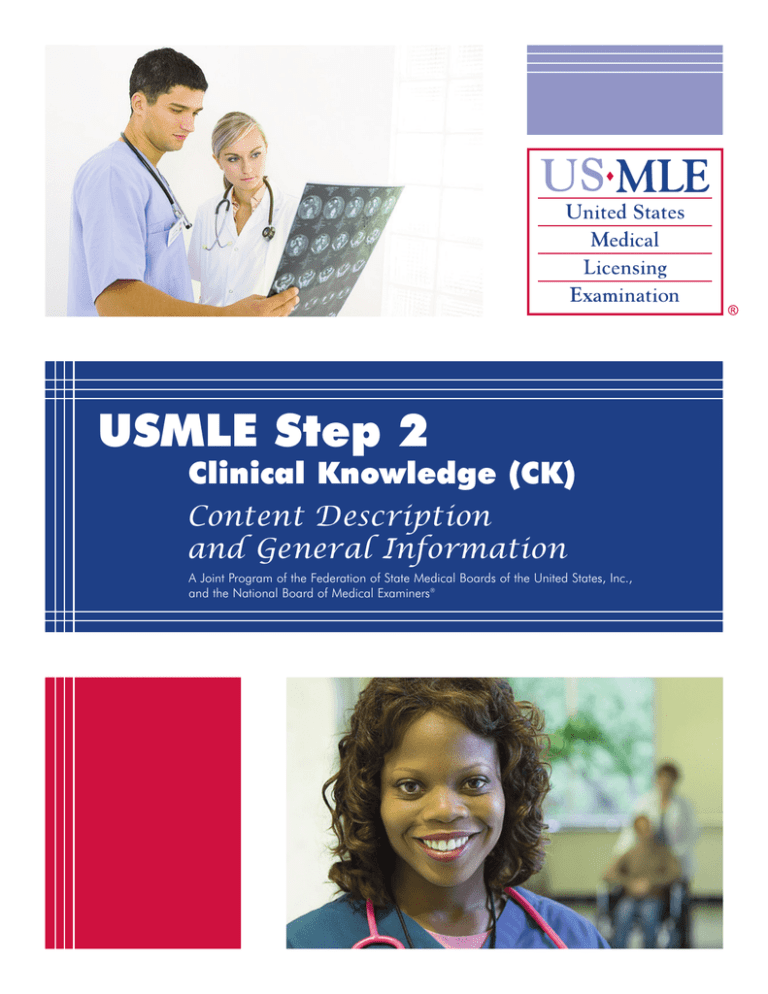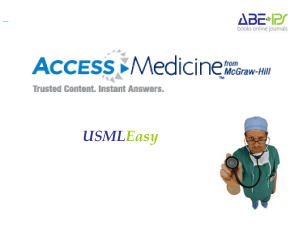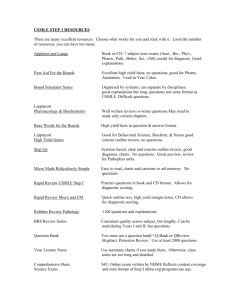
USMLE Step 2
Clinical Knowledge (CK)
Content Description
and General Information
A Joint Program of the Federation of State Medical Boards of the United States, Inc.,
and the National Board of Medical Examiners®
This booklet updated July 2015.
Copyright © 2015 by the Federation of State Medical Boards of the United States, Inc. (FSMB), and the
National Board of Medical Examiners® (NBME®). All rights reserved. Printed in the United States of
America. The United States Medical Licensing Examination (USMLE®) is a joint program of the FSMB and
the NBME.
1
CONTENTS
Introduction …………………………………………………………...…….…… 3
Examination Content …………………….……………………………………... 3
Content Outline …………………....………………............................................
3
Testing Time ……………………………………….…………………………… 4
Test Specifications ………………………………………………………………. 5
2
Introduction
Examination Content
This booklet is intended to help you prepare for
the Step 2 Clinical Knowledge (Step 2 CK)
component of the United States Medical
Licensing Examination® (USMLE®).
Step 2 CK consists of multiple-choice questions
prepared by test material development
committees composed of faculty members,
teachers, investigators, and clinicians with
recognized prominence in their respective fields.
Committee members are selected to provide broad
representation from the academic, practice, and
licensing communities across the United States
and Canada.
The information in this booklet, sample test
materials and tutorials, and other informational
materials are available on the USMLE Web site
(http://www.usmle.org).
Test questions focus on the principles of clinical
science that are deemed important for the practice
of medicine under supervision in postgraduate
training.
In addition to the information in this booklet, you
should review relevant sections that appear in the
USMLE Bulletin of Information.
Sample test materials are available on the
USMLE Web site, in downloadable computer
format, with tutorials, and as sample items in a
booklet. You must run the tutorial and sample
test items to become familiar with the test
software prior to your test date. The tutorial
provided at the beginning of the Step 2 CK
examination has fewer screens and less detailed
information than the tutorial available in the
Step 2 practice materials on the USMLE Web
site.
Content Outline
All USMLE examinations are constructed from
an integrated content outline, available on the
USMLE Web site (http://www.usmle.org/pdfs
/usmlecontentoutline.pdf), which lists content
organized according to general principles and
individual organ systems. Test questions are
classified into one of 18 major categories,
depending on whether they focus on concepts and
principles that are applicable across organ
systems or within individual organ systems.
In addition, the practice materials on the USMLE
Web site include an additional block of items with
associated audio or video findings, a sequential
item set, a pharmaceutical advertisement item set,
and an abstract item set (a summary of an
experiment or clinical investigation, accompanied
by two or more questions). You should become
familiar with all item formats that may be used in
the actual examination before your test date.
Sections focusing on individual organ systems are
subdivided according to normal and abnormal
processes, including principles of therapy.
While not all topics listed in the content outline
are included in every USMLE examination,
overall content coverage is comparable in the
various examination forms that will be
administered to different examinees for each Step.
Please monitor the USMLE Web site
(http://www.usmle.org) announcements section to
check for changes in the test delivery software
and to access updated practice materials. You
must obtain the most recent information before
taking any USMLE examination.
Most organ systems are subdivided into normal
and abnormal processes, and include
subcategories of specific disease processes. In
most instances, knowledge of normal processes is
evaluated in the context of a disease process or
specific pathology. See Tables 1 and 2 (pages 5
and 6).
3
The content outline is not intended as a
curriculum development or study guide. It
provides a flexible structure for test construction
that can readily accommodate new topics,
emerging content domains, and shifts in
emphasis. The categorizations and content
coverage are subject to change. Broadly based
learning that establishes a strong general
understanding of concepts and principles in the
clinical sciences is the best preparation for the
examination.
Testing Time
Step 2 CK is a one-day examination. It is divided
into eight 60-minute blocks and administered in
one 9-hour testing session. The number of
questions per block on a given examination form
will vary, but will not exceed 44. The total
number of items on the overall examination form
will not exceed 350.
There is also a minimum allotment of 45 minutes
of break time and a 15-minute optional tutorial.
The amount of time available for breaks may be
increased by finishing a block of test items or the
optional tutorial before the allotted time expires.
4
Test Specifications
Table 1: Step 2 CK Test Content Specifications*
System
Range
General Principles of Foundational Science**
1% – 3%
Immune System
Blood & Lymphoreticular Systems
Behavioral Health
Nervous System & Special Senses
Skin & Subcutaneous Tissue
Musculoskeletal System
Cardiovascular System
Respiratory System
Gastrointestinal System
Renal & Urinary Systems
Pregnancy, Childbirth, & the Puerperium
Female Reproductive System & Breast
Male Reproductive System
Endocrine System
Multisystem Processes & Disorders
85% – 95%
Biostatistics & Epidemiology/Population Health
Interpretation of the Medical Literature
1% – 5%
* Percentages are subject to change at any time. See the USMLE Web site (http://www.usmle.org) for the
most up-to-date information.
** The general principles category for the Step 2 CK examination includes test items concerning normal
processes not limited to specific organ systems. These test items are typically related to normal
development. Categories for individual organ systems include test items concerning those normal and
abnormal processes that are system-specific.
5
Physician Tasks/Competencies
An additional organizing construct for Step 2 CK design is physician tasks and competencies, as shown in
Table 2. More information about the physician tasks and competencies outline is available on the
USMLE Web site (http://www.usmle.org/pdfs/tcom.pdf). Items are constructed to focus on assessing one
of the following competencies:
•
Medical knowledge/scientific concepts: Applying foundational science concepts
•
Patient care: Diagnosis
•
Patient care: Management
•
Communication and interpersonal skills
•
Professionalism, including legal and ethical issues
•
Systems-based practice, including patient safety
•
Practice-based learning, including biostatistics and epidemiology
Table 2: Step 2 CK Physician Task/Competency Specifications
Competency
Range
Medical Knowledge/Scientific Concepts
10% – 15%
Patient Care: Diagnosis
History/Physical Examination
Laboratory/Diagnostic Studies
Diagnosis
Prognosis/Outcome
40% – 50%
Patient Care: Management
Health Maintenance/Disease Prevention
Pharmacotherapy
Clinical Interventions
Mixed Management
Surveillance for Disease Recurrence
30% – 35%
Communication
Professionalism
Systems-based Practice/Patient Safety
Practice-based Learning
3% – 7%
6


